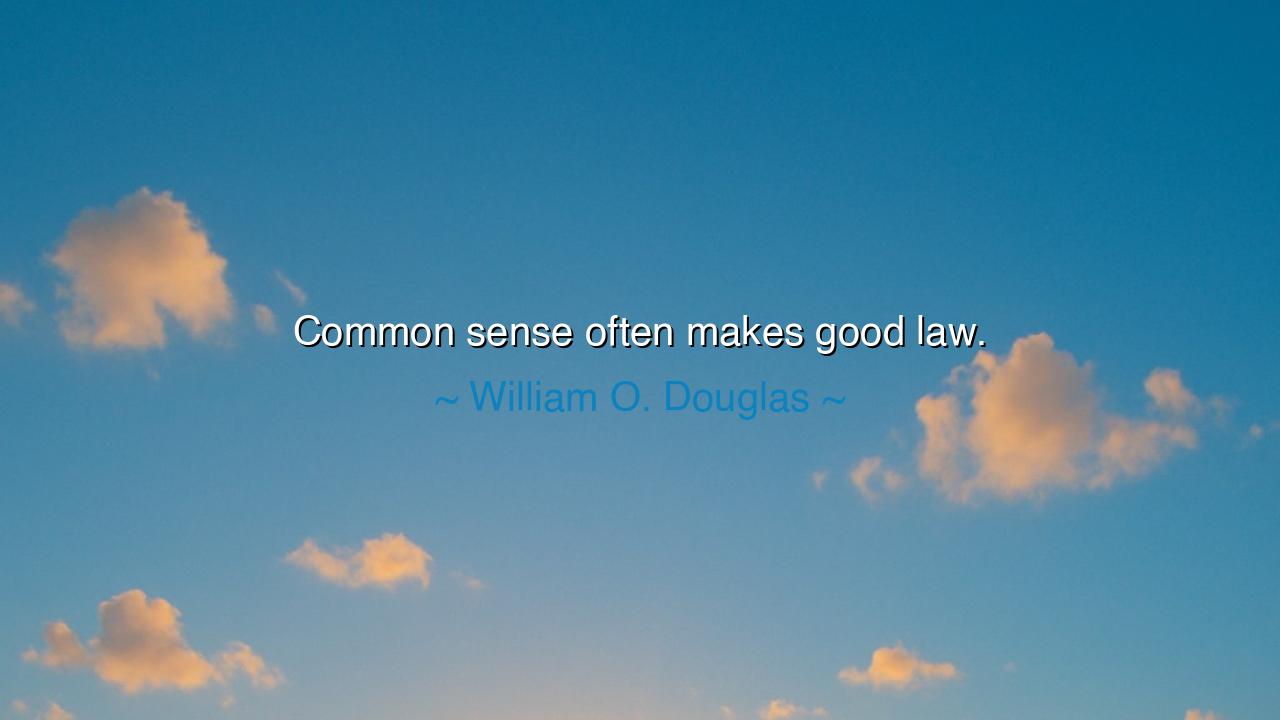
Common sense often makes good law.






Hear now the words of William O. Douglas, a justice of the United States Supreme Court, who declared with clarity: “Common sense often makes good law.” Though brief, this utterance carries the weight of centuries of human striving for justice. For in it lies the reminder that not all wisdom comes from books or endless debate. Sometimes, the simplest truths—those plain to every eye and ear—form the surest foundation for the laws of nations.
To say that common sense makes good law is to recognize that justice must be rooted in the life of the people. Laws written only in the language of scholars and courts may grow cold and rigid. But laws born of plain wisdom—“treat your neighbor fairly,” “do not steal what is not yours,” “do not harm the innocent”—are laws that endure. They are grounded not in complexity but in clarity, reflecting the deep instincts of human conscience. Douglas, who sat long upon the highest bench, saw this truth: that when law wanders far from the soil of common life, it becomes brittle and unjust.
History itself bears witness. Consider the Magna Carta of 1215, forced upon King John of England by his barons. Though not filled with lofty theory, it contained simple principles that echoed common sense: that no man should be imprisoned without due process, that even a king must respect the law. These principles, plain and obvious to those who suffered injustice, became the seed of constitutional freedom across the world. Here we see Douglas’s teaching embodied: the laws that shaped empires arose not from complexity, but from the straightforward wisdom of fairness.
Even in the United States, the great movements for civil rights were not grounded in complicated theories alone, but in appeals to common sense. When Rosa Parks refused to yield her seat, her act was simple: why should one woman, weary from work, be forced to stand for another simply because of her skin? The law said otherwise, but common sense declared the law unjust. And in time, the law was rewritten to align with the truth that had been plain all along. Thus, the wisdom of Douglas shines: that the best laws are those that reflect what ordinary hearts already know to be right.
And yet, there is also a caution in his words. For while common sense is a guide, it must be purified by compassion and broadened by reason. What seems like sense to one generation may, if unexamined, become prejudice or narrowness. Slavery once seemed like “sense” to the powerful, yet it was never just. Therefore, Douglas’s teaching is not to enshrine every instinct as law, but to remember that enduring law must rest on principles that are both plain and humane, so deeply rooted in fairness that they can withstand the storms of time.
The lesson for us is this: seek simplicity in justice. When confronted with disputes, ask not first what is most profitable or most technical, but what is most fair, most human, most rooted in the dignity of all. Let your own dealings reflect this wisdom: speak truth, keep promises, honor your neighbor. In these acts of common sense, you are already practicing the essence of law, and building a foundation for greater justice in your community.
Therefore, let each one act with vigilance and humility. Do not hide behind endless words when the right path is plain before you. Do not excuse cruelty with technicalities, nor cloak injustice in clever reasoning. Instead, let your heart and mind rest upon that which every conscience can see: fairness, honesty, respect for life. For as Douglas taught, the laws that endure are those that align with the simple truths of the people—and in such truths, nations find both strength and peace.
So remember these words: “Common sense often makes good law.” Carry them into your daily choices. Teach them to your children, who will shape the laws of tomorrow. And know this: when the law grows weary, and when debates grow endless, it is often in returning to the wisdom of the simple, the plain, the universally human, that justice finds its clearest voice.






AAdministratorAdministrator
Welcome, honored guests. Please leave a comment, we will respond soon